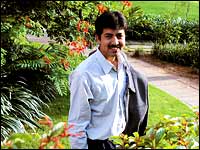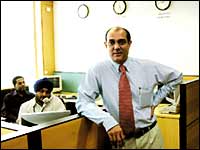 |
| The hunt is on: IIM-B students prepare
for placement |
When Ganesh
Murugiyan entered what was then IIT BHU, chances are, he wouldn't
have seen himself going on to be an investment banker. Which is
what Murugiyan, in his early 30s, who boasts a post-graduate diploma
in business management (PGDBM) from the Indian Institute of Management,
Calcutta, is. It is also unlikely that he would have ever seen
himself becoming a celebrity brand endorser, which is what Murugiyan
saw himself become when his firm went wooing talent at his alma
mater.
The idea came from Vijayalakshmi Srinivasan,
the head of hr at DSP Merrill Lynch. Her presentation was replete
with information-the profile of the firm, the roles, responsibilities
and challenges on offer-but it lacked that little bit of intangible
magic that separates a commodity from a brand. And so, she decided
to include profiles of some of the school's alumni that were on
the fast track at the firm (for good measure, she also made sure
the visiting team had an alumnus, Ravi Bala, who had graduated
in 2004 from the school to act as a point of contact). Which is
how Murugiyan became a celebrity endorser.
THE MOST IMPORTANT FACTORS-RECRUITERS
Recruiters believe success of placement
is sign of a school's standing. |
| PARAMETER |
PROPORTION OF WANNABE
MBAS THAT CONSIDERS THIS MOST IMPORTANT
|
| Reputation |
17
|
| Success of Placement |
26
|
| Teaching Methodology |
9
|
| Quality of Placement |
20
|
| Infrastructure |
6
|
| Specialisation |
5
|
| Faculty |
11
|
| Admission Eligibility |
6
|
| All figures in per cent |
Elaborate? Not really, says Pratik Kumar,
Corporate Vice President, hr, Wipro. "It is not a starry-eyed
crowd that can be impressed with data," he says, referring
to the graduating batch at B-schools. "The appeal has to
be more specific and individualistic." Kumar should know.
This year, Wipro hired 140 people from 15 B-schools to fuel its
it- and it services-fuelled growth engine (the company's revenues
grew by 39.2 per cent in 2004-05; net profit by 63.4 per cent).
Nita Law, Head, hr, Standard Chartered Bank agrees with Kumar.
"Interaction with B-schools is no longer during the PPT alone;
the engagement is throughout the year and a lot more elaborate."
And Srinivasan should know. Her firm may have hired just eight
people from four campuses (three IIMs and Indian School of Business,
Hyderabad) but that low number is a function of the industry itself.
Like consulting firms, I-banks hire only a few people from B-school
campuses (they rarely hire elsewhere) every year; these jobs are
among the most desired.
|
|
Bhaskar
Das
Vice President/HR/Cognizant Technologies
Went to eight B-schools, IIM Ahmedabad,
IIM Bangalore, IIM Calcutta, IIM Lucknow, Indian School of
Business, XLRI, Great Lakes (Chennai) and Asian School of
Management, Manila; made 100 offers, of which 70 were accepted;
Das will continue to focus aggresively on hiring as Cognizant
is growing rapidly and moving into offering its IT services
in more areas(read: verticals) |
With the Indian economic engine purring along
nicely, and companies on overdrive (results for a sample of 1,528
companies shows that revenues increased 19.37 per cent in 2004-05,
and net profit, 28.74 per cent), there is a growing demand for
MBAs (the term, loosely used across India Inc., encompasses post
graduates in economics from prestigious schools such as Delhi
School of Economics, PGDBMs from the IIMs, and other such).
Yet, visiting the right schools, and that
done, hiring the right students from the school is something,
part-science, part-art, over which heads of hr such as Kumar,
Law and Srinivasan lose a lot of sleep. For instance, what made
Bhaskar Das, Vice President, hr, Cognizant Technologies, a rapidly
growing American it services firm built around the India advantage,
target Chennai-based Great Lakes? After all, the other seven schools
the firm hired from were IIM Ahmedabad, IIM Bangalore, IIM Calcutta,
IIM Lucknow, Indian School of Business, XLRI, and Asian School
of Management, Manila.
The Right Schools And The Right People
Some schools-the IIMs, Faculty of Management
Studies, Delhi, XLRI, Jamshedpur, and Jamnalal Bajaj Institute
of Management Studies in Mumbai-pick themselves. They boast a
vintage of between 35 and 56 years (which would mean the first
batch to graduate from the schools is now in leadership positions
in organisations in India, even elsewhere). However, recent years
have seen the emergence of a large number of B-schools. According
to Sanjay Chaudhary, Chief Operating Officer, IMS, an MBA preparatory
training institute, in the two years between 2002 and 2004, some
200 new B-schools were founded. Recruiters address this challenge
by evaluating the school on the basis of its infrastructure (physical
as well as intellectual) or the quality of the admission process.
 |
Vijayalakshmi
Srinivasan
Head/HR/DSP Merrill Lynch
Went to IIM Ahmedabad, IIM Bangalore,
IIM Calcutta and ISB; hired 6 investment bankers from the
IIMs and two MBAs for sales and marketing functions in the
asset management side from ISB; Srinivasan believes that grades
are important; it takes something to be in the top 20 per
cent of a class, she says |
Cognizant recruited from Great Lakes, says
Das, because "it helps in experimenting and including fresh
(schools)". It doesn't hurt that the school was founded by
Bala V. Balachandran, a professor at Kellogg School of Management,
and a man recognised all over the world for his work on costing
and accounting.
Not every school, however, is founded by
an individual of such stature or catalysed by a consulting firm
(the way McKinsey did Indian School of Business). "We hired
from Institute of Financial Managment and Research (IFMR), Chennai,
for the first time this year," says Ramkumar, GM (HR), ICICI
Bank. "We went there because it is important to get fresh
ideas." Then, there are listings of B-schools such as the
one this magazine puts out. "We just look at the top 15 schools
in BT's list and go there," says a recruiter at one of India's
largest it services firms.
Schools chosen, recruiters get on to the task
of picking from the extraordinary display of talent on hand. "Most
companies," says Ranjan Das, Professor, Strategic & International
Management, IIM Calcutta, "look for well-trained graduates
who understand the big picture, specialise and can be of value
from Day 1." Grades (actually grad point averages) do matter
but most recruiters believe that the stringent entry norms into
India's best B-schools (like the IIMs, XLRI and FMS) ensures that
there is little that separates the toppers from, say, the mid-rankers.
Which could explain why almost all of them use grades, analytical
ability and knowledge of the subject as basic filters, proceeding
to pick candidates on the basis of what suits their organisations
best.
 |
Pratik
Kumar
Corporate Vice President/HR/Wipro
Went to the top 15 B-schools and recruited
close to 140 people; Kumar continues to maintain a fair balance
of fresh graduates and those with prior experience; he insists
the first are easy to mould and latter get on the job sooner |
Hindustan Lever Limited (HLL), for instance,
looks for "passion". "We hire leaders," says
Ajay Kumar, Managment Development Manager, HLL. "Their vision,
delivery and commitment to growth are the most important criteria
for selection." Asian Paints looks for the ability to think
"out of the box". "It is important that fresh employees
make an impact on the company," says Vivek Patwardhan, Vice
President, hr, Asian Paints. "They shouldn't just fall in
line." HSBC, according to Joel Farnworth, Head, HR, HSBC
India, "explores their extra-curricular interest and a proven
record of leadership". And Citigroup India, looks for "execution
capability and the ability to influence", according to Pradeep
Mukherjee, Country Human Resources Director, Citigroup India.
Each company looks for something that it believes
will make a difference to its prospects. it services firms, for
instance, look for MBAs who can combine a broad understanding
of it (they need not know how to code) with "the right consulting
and client facing skills", says Cognizant's Das.
Still, despite everything they do right, recruiters
may find that the kind of people they want are already taken.
What Happens If You Can't Get The Right
People
Like Infosys Technologies did in 2003 at
Indian Institute of Management, Ahmedabad. By the time the firm
got its turn at the talent available, most had been taken. Rather
than pick from the remains of the batch, the company chose to
walk out. That shouldn't surprise anyone who knows the dynamics
of the campus-placement market.
 |
Pradeep
Mukerjee
Country Human Resources Director/Citigroup India
Went to over 40 B-schools and recruited
close to 260 MBAs across Citigroup organisations; Mukherjee's
department is very busy during campus-season; they have to
find people for the group's multiple businesses in India;
like Citi, we are told, they rarely sleep |
At most good B-schools, demand outstrips supply.
These schools, recruiters agree, produce just the kind of managers
they need. "A pragmatic change in syllabus (at most schools)
has made it more in sync with industry," says Pawan Bhatia,
Head, hr, Pepsi India. "Corporates are (thus) keen to tap
the talent available." Some schools try and make things better
by imposing constraints on students (at IIM, Ahmedabad, for instance,
the maximum number of offers a student can receive is two). Still,
at the better B-schools, all slots on Day 0 (the first day of
the placement season) are occupied by consulting firms and I-banks.
"Students perceive the investment banking job as a better
utilisation of talent and also value the (opportunities for) interaction
with their counterparts from international business schools (that
such jobs promise)," says Bakul Dholakia, Director, IIM,
Ahmedabad.
One fallout of this is the very invention
of the term Day 0; thought up by IIM, Ahmedabad in 1997, this
was effectively a way to tell Day 1 companies that they were no
longer the most preferred on campus without having to relegate
them to the Day 2 classification (whether a company is Day 0,
or Day 1, or 2 is decided by the students). Another is that companies
in areas other than investment banking and consulting have had
to think out of the box. For instance, HLL and Pepsi focus on
the phenomenon of the local operations increasingly becoming integrated
with the global one, and the possibility of a global career. When
it comes to getting the best management talent around, there are
no full stops.
|








